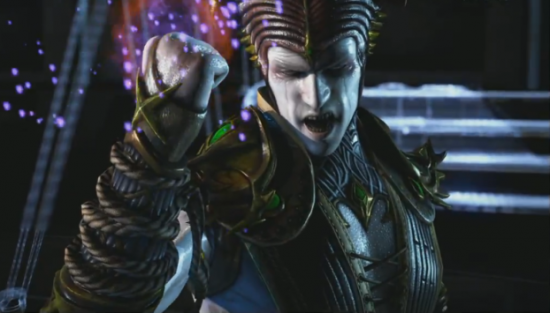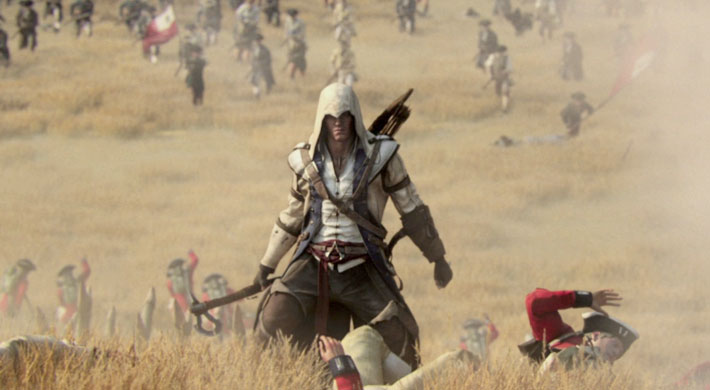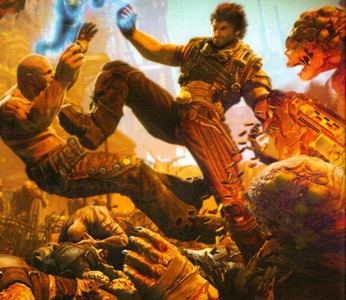

It’s only fitting that as we say goodbye to the PlayStation 3, and welcome the PS4, that Sony parade out some of its current-gen all-stars for one last show. We’ve seen already seen the likes of Nathan Drake and Sweet Tooth give the console its proper send-off, and now it’s the angry, ashen Spartan, Kratos’ turn in God of War: Ascension.
Unfortunately, for as much as it is a delight to see one more God of War game on the PS3, Ascension is a rather large disappointment. Much like many of the #4 titles we’ve been seeing lately, the game feels more like a cash grab than anything else — a sub-part entry in a typically stellar franchise. There’s a conscious effort to keep things fresh, as indicated by the inclusion of multiplayer, and that breeds promise at the outset, but after the first couple hours it becomes clear this game can’t hold a candle to God of War 3, or any of the God of War games for that matter.
Set prior to God of War 1, and somewhere in between the PSP God of War titles, Ascension sees Kratos facing the repercussions of breaking his oath to Ares. Sent forth to carry out Kratos’ punishment are the Furies, a group of sisters that are as wicked as they are alluring. Kratos’ quest is told mostly in flashback, with the anchor storyline focusing on his singular goal of killing the Furies, before setting his sights squarely on the God of War himself.
For the most part, though, the story is pretty forgettable — with few significant highs — as it plods towards an inevitable face-off with the sisters. In fact, most of the time it’s not even clear why Kratos is doing what he’s doing. It’s almost as if the razor thin story was crafted just to give the player somewhere to go and something to do. To be fair there are some details towards the end that feed back into the overarching God of War universe, and those parts are interesting, but don’t expect something as impressive as a war against the gods.
It’s not a terrible loss that the story isn’t terribly interesting, as narrative has always played second fiddle to God of War‘s refined combat. With Ascension, Sony Santa Monica has stripped bare most of the evolved combat of the series, and focused squarely on the chain blades. Instead of a gradually growing arsenal, Kratos spends the entire 8-hour campaign whipping and whirling his foes before tearing them limb from limb. Because they aren’t forced to play Sophie’s choice with their weapons, players can really dial into the chain blade combos, and by the time they’re done players will be masters of the chain blade.
Even though the chain blades take center stage in Ascension, the game introduces four god-based augments (fire, ice, lightning, souls) for the blades, which the player can switch between on the fly. The different augments don’t change combat too dramatically, the player is still basically working with a similar move set, but they do make for colorful flashes across the screen. Really, the only utility of the augments comes into play with the kills, as each deliver a different color orb. Kill an enemy using the souls augment, for example, and you get more green orbs to replenish your health.
With a greater focus on the chain blades, the combat feels more focused than ever. Unfortunately, the same can’t be said when enemies get involved. One of Ascension‘s major faults is its lack of balance. While in past God of War titles, the enemy encounters have been challenging — forcing the player to attack, dodge, and block at the right times — the challenge in Ascension seems to stem more so from poor design.
In most encounters, enemies pour onto the screen, overwhelming Kratos and leaving him vulnerable almost every second. And when the game’s fixed camera pulls way back, or delivers an odd angle, it becomes almost impossible to make sense of the onscreen action, let alone survive. At times, players will be able to get into a nice rhythm as they turn the game’s various mythical creatures into piles of viscera, brains, and limbs, but other times the encounters devolve into frustrating barrages of enemy attack after enemy attack with little to no hope of escape.
All in all, the meat of the game — the combat — is substantially less refined than in any of the previous games. To design a game to be challenging is one thing, but to throw waves of enemies and simply hope the player figures out how to survive is poor game design.
Similarly, the platforming/traversal segments in Ascension are poorly designed, and lead to frustrating death after frustrating death. The environments in Ascension are still as detailed as ever, and there are some levels that are simply gorgeous. However, any time the player is asked to get from point A to point B using a combination of jumping, climbing, running, or sliding things get a little too imprecise. Players will likely die a lot in this game, but when those deaths lead to frustration it detracts from the entertainment.
For the first time, the God of War franchise also includes a multiplayer variant. Back at E3, we were mostly underwhelmed by Ascension‘s multiplayer, and nothing much has changed. The ability to align yourself with a god (Hades, Ares, Poseidon or Zeus) helps eliminate the fear that the multiplayer will be filled with 8 little Kratoses running around, but the game’s combat — which is an extension of the single player’s combo-focused attacks — doesn’t lend itself well to a multiplayer environment.
There are several customization options for player’s to fine tune their fighter, and a handful of interesting modes to choose from, but, again, balance becomes an issue. After a few matches, players will find that skirmishes typically devolve into a game of “attack the player with the least amount of health.” Most players will only attack when their opponents are vulnerable, or when they can overwhelm them with a teammate. When you’re on the giving end of the beatdown it’s fun, but getting pummeled without much in the way of defense it’s hard to see yourself returning to the mode like Sony had hoped.
For as much as the multiplayer tries something new, there’s a reason character action is called character action — it’s designed as a single player experience. Some players might find some fun in the early matches, but when playing against more seasoned opponents, specific (read: cheap) tactics end up taking away most of the entertainment.
God of War: Ascension is easily the least enjoyable of the main God of War games. There are shades of God of War peppered throughout, but no single element is completely successful. The combat, the story, and the platforming all come across as half-baked ideas. Even the game’s puzzles, which use some interesting magic-based tricks like healing or decaying environments, don’t do much to elevate familiar mechanics. For example, Kratos’ ability to create a doppelganger — a trick that also comes in handy in combat — is mostly used for holding switches in place or standing on buttons. The game is not significantly broken or unplayable, mind you; it just doesn’t come close to the high bar its predecessors set. It has the scope and the visual fidelity, but surface level qualities like those only get players so far when the gameplay mechanics feel imbalanced.
Ultimately, the game doesn’t validate its existence, plain and simple. After God of War 3 put a nice bow on the franchise, it was going to take something more than a middling prequel to get fans excited. Unfortunately, that’s what we got.
[NOTE: There are massive audio problems with the game for players using a home theater set-up. Sound effects fail to register, audio syncing is off, and occasionally the audio will drop out altogether. Sony is working on a patch that should be out some time next week, but it’s worth mentioning the audio issues as they were wholly distracting and actually detracted from the experience]
Have you had a chance to check out God of War: Ascension? What do you think of the game? Let us know in the comments below.
God of War: Ascension is available now for the PS3.
Follow me on Twitter @ANTaormina



